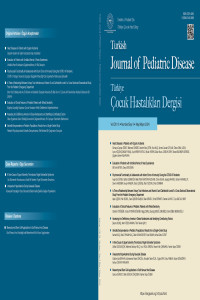Öz
Üst ekstremite derin ven trombozu (UEDVT) çocuklarda ve ergenlerde oldukça nadir görülür. Paget-Schroetter sendromu (PSS), subklavyen venöz (SV) aksiller sistemin primer, spontan trombozudur. Burada; düzenli vücut geliştirme egzersizleri yapan PSS tanısı alan iki hastayı bildirmekteyiz.16 yaşında iki erkek hasta sağ üst ekstremitede şişlik, soğukluk ve ağrı şikayetiyle başvurdu. Yakın zamanda, vücut geliştirme egzersizleri yaptıkları öğrenildi. Fizik muayenede her iki kol çaplarında arasında fark olduğu, üst ekstremitelerde soğukluk ve üst ekstremite toplar damarlarında belirginleşme dikkat çekmişti. Her iki olguda da üst ekstremite venöz doppler ultrasonografide sağ SV proksimal lümeninde akut trombüs saptandı. Medikal tromboz tedavisine ek olarak cerrahi tedavi uygulandı. Tromboz sonrası iyileşmenin optimal olabilmesi için PSS’nin erken tanı ve tedavisi önemlidir. Bu nedenle ağır egzersiz öyküsü olan genç erkeklerde üst ekstremiteyi ilgilendiren şişlik, soğukluk, ağrı yakınmalarında PSS düşünülmelidir.
Anahtar Kelimeler
Kaynakça
- Yunce M, Sharma A, Braunstein E, Streiff MB, Lum YW. A case report on 2 unique presentations of upper extremity deep vein thrombosis. Medicine (Baltimore) 2018;97:e9944.
- Huang CY, Wu YH, Yeh IJ, Chen YY, Kung FY. Spontaneous bilateral subclavianNvein thrombosis in a 40-year-old man: A case report. Medicine (Baltimore) 2018;97:e0327.
- Urschel HC Jr, Patel AN. Surgery remains the most effective treatment for Paget-Schroetter syndrome: 50 years’ experience. Ann Thorac Surg 2008;86:254-60.
- Hangge P, Rotellini-Coltvet L, Deipolyi AR, Albadawi H, Oklu R. Paget-Schroetter syndrome: treatment of venous thrombosis and outcomes. Cardiovasc Diagn Ther 2017;7:S285-S290.
- Glavich G, Gourley J, Fong V. Paget-Schroetter syndrome with bilateral pulmonary emboli. Radiol Case Rep 2017;31;13:28-31.
- El-Attrache A, Kephart E. Paget-Schroetter Syndrome: a case report of diagnosis, treatment, and outcome in a healthy 18-year-old athletic swimmer. Phys Sportsmed 2020;48:358-62.
Öz
Upper extremity deep vein thrombosis (UEDVT) is extremely rare in children and adolescents. Paget - Schroetter Syndrome (PSS) is the primary, spontaneous thrombosis of the subclavian venous (SV) axillary tract. Herein, we report on PSS in two children who did regular body building exercises. 16-year-old two male patients admitted with complaints of swelling, coldness and pain on the right upper extremity. Their recent history disclosed that they have been doing advanced body building exercises for the last year. Physical examination revealed a difference of 4 cm and 5 cm in the diameter of each arm, as well as coldness and venous engourgement in the upper extremities. An acute thrombus was present in the proximal right SV lumen and no flow was detected on upper extremity venous doppler ultrasaund. Surgical treatment was performed in addition to medical thrombosis treatment. Early diagnosis and treatment of PSS is important for better outcomes. PSS should be considered in young patients with UEDVT, especially those with a history of vigorious exercise.
Anahtar Kelimeler
Kaynakça
- Yunce M, Sharma A, Braunstein E, Streiff MB, Lum YW. A case report on 2 unique presentations of upper extremity deep vein thrombosis. Medicine (Baltimore) 2018;97:e9944.
- Huang CY, Wu YH, Yeh IJ, Chen YY, Kung FY. Spontaneous bilateral subclavianNvein thrombosis in a 40-year-old man: A case report. Medicine (Baltimore) 2018;97:e0327.
- Urschel HC Jr, Patel AN. Surgery remains the most effective treatment for Paget-Schroetter syndrome: 50 years’ experience. Ann Thorac Surg 2008;86:254-60.
- Hangge P, Rotellini-Coltvet L, Deipolyi AR, Albadawi H, Oklu R. Paget-Schroetter syndrome: treatment of venous thrombosis and outcomes. Cardiovasc Diagn Ther 2017;7:S285-S290.
- Glavich G, Gourley J, Fong V. Paget-Schroetter syndrome with bilateral pulmonary emboli. Radiol Case Rep 2017;31;13:28-31.
- El-Attrache A, Kephart E. Paget-Schroetter Syndrome: a case report of diagnosis, treatment, and outcome in a healthy 18-year-old athletic swimmer. Phys Sportsmed 2020;48:358-62.
Ayrıntılar
| Birincil Dil | İngilizce |
|---|---|
| Konular | İç Hastalıkları |
| Bölüm | CASE REPORTS |
| Yazarlar | |
| Erken Görünüm Tarihi | 15 Şubat 2024 |
| Yayımlanma Tarihi | 13 Mayıs 2024 |
| Gönderilme Tarihi | 21 Kasım 2023 |
| Kabul Tarihi | 10 Ocak 2024 |
| Yayımlandığı Sayı | Yıl 2024 Cilt: 18 Sayı: 3 |

